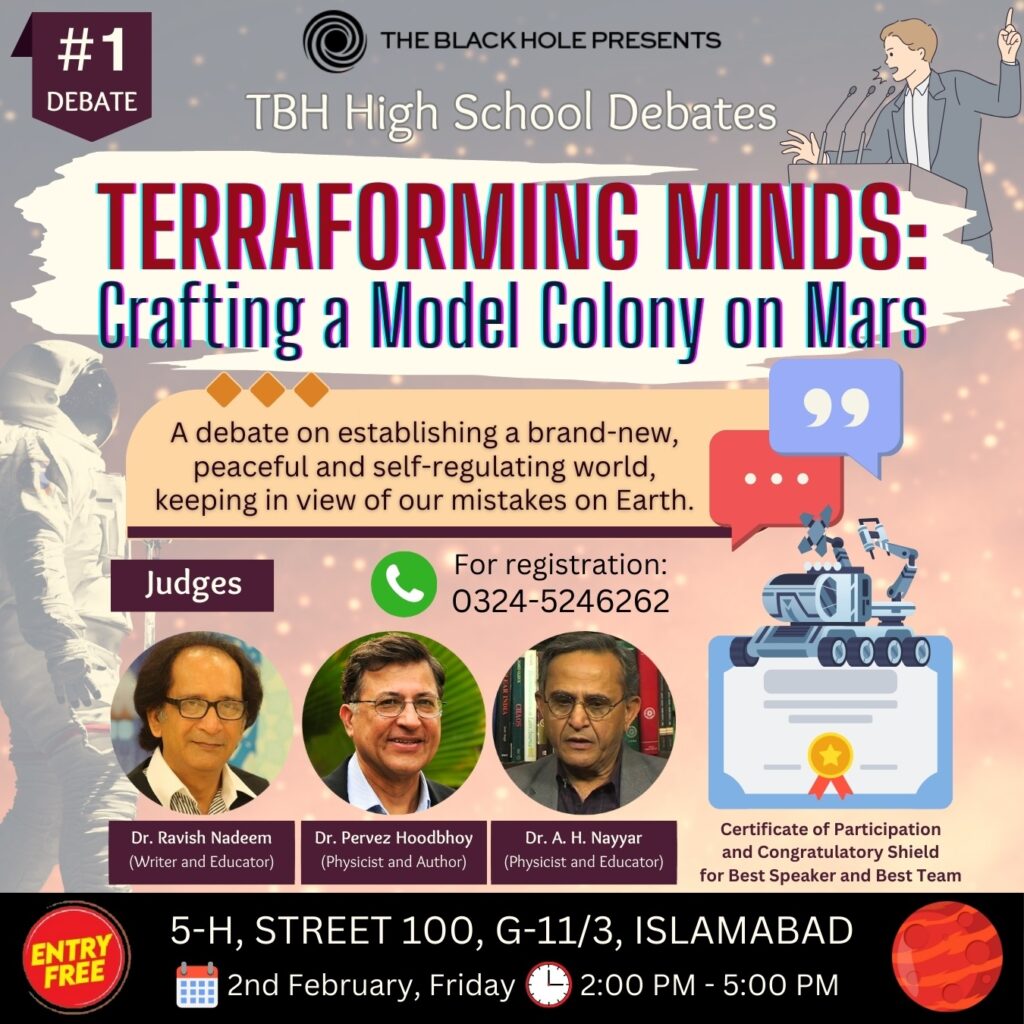
Terraforming Minds: Crafting a Model Colony on Mars (Debate # 1)
TBH High School Debates
The Black Hole series of high school debates is intended for young, thoughtful high school students with ages between 16-18 with an interest in understanding how our world works and how it could be made to work better. Schools can nominate teams or students can apply independently. Each team must consist of two students. There is no application fee.
Debate #1: Terraforming Minds: Crafting a Model Colony on Mars

Everyone agrees that it is only a matter of time before humans begin populating outer space. In the next 150-200 years (if not sooner) a small domed human colony will likely be established on Mars. It will be self-reproducing and independent of Earth. With time it will grow in numbers and humans will ultimately populate much of Mars through terraforming. Such a colony will be the first step towards moving into the rest of the solar system and then even further beyond. The Colony will be a haven for humans fleeing pollution, wars, and ethnic-religious strife on Earth. It is therefore crucial to avoid the mistakes made on Earth.
Imagine that you have been made a chief social architect of the Colony project. Scheduled for the year 2150, it will be funded by the United Nations through a tax levied upon all 200+ member states. The project calls for 100 people to be sent one-way to Mars (the return journey is expected to be impossibly difficult for some centuries). They will live their lives there and eventually die there.
Long-term survival and growth of the colony in an extremely hostile environment will depend critically on choosing exceptionally (physically) strong and highly intelligent persons as the first 100 pioneers. Further, these persons must be able to cooperate well and bond with each other. As a societal engineer tasked with creating a harmonious society you must argue on how to deal with the following questions:
Questions to debate:
- From which countries should the pioneers be chosen and how many from each? Will the pioneers be expected to be loyal to their parent country?
- What should be the distribution of races? What should be the language of communication? One language or many?
- Will the Colony have a single religion? Many religions? No religion? Will religion be forbidden?
- Will the leader be elected or appointed? Will political parties be allowed?
- Group identity (commonality of race, religion, ethnicity, language) has both plusses and minuses on Earth. How will this work out in the Colony and how to deal with it? Will group identity be welcomed or punished?
- What will be the governance structure of the Colony (education, health, dispute resolution)? Remember that governments on Earth will have no say in Colony matters.
- To compensate for natural and accidental death the Colony requires babies be born on Mars. Will a child have a mother and father as on Earth? To free the mother for other work, should the child be born in a special biological unit and belong to the entire Colony?
Judges:
● Dr. Pervez Hoodbhoy
Dr. Pervez Hoodbhoy is a nuclear physicist, author and prominent critic on social issues. He received his PhD from MIT and taught physics at Quaid-e-Azam University, Islamabad for over 45 years.
● Dr. A. H. Nayyar
Dr. Abdul Hameed Nayyar is a Pakistani physicist, author, and a consultant on the issues of education, nuclear safety, and energy. He has served in the faculties of the Quaid-e-Azam University, Islamabad from 1973 till 2005 and the Lahore University of Management Sciences (LUMS).
● Dr. Ravish Nadeem
Dr. Ravish Nadeem is a writer, literary critic and professor of Urdu literature.
Moderators:
● Shahryar Khan (PhD Physics candidate at U of Houston, science instructor at TBH, public speaker and former debater)
● Mischa Manahil (A-levels student, experienced debater active in the local circuit)
Debate Format:
1. Opening Statements (3 minutes per team):
- Each team begins with a succinct and impactful opening statement covering all the questions given in the topic description.
- Clearly define their stance on each question.
- Provide a brief outline of key arguments to set the stage for the discourse.
2. Discussion Phase (1 hour):
- Floor is open for discussion where teams present and defend their arguments.
- Teams take turns building their case and responding to opponent arguments.
- Moderators facilitate a dynamic exchange, ensuring a balanced and respectful discourse.
Guidelines for Discussion Phase:
- Teams must present well-reasoned arguments supported by evidence.
- Constructive engagement is encouraged; personal attacks are strictly prohibited.
- Teams are expected to actively listen and respond to each other’s points.
- Active participation by both members of the team is encouraged.
- Moderators may introduce probing questions to stimulate deeper discussion.
3. Closing Statements (3 minutes per team):
- Teams offer a concise summary of their key points and restate their position.
- Use this time to leave a lasting impression and reinforce the strength of their arguments.
- Closing statements aim to solidify the team’s stance and persuade the audience.
Scoring Criteria
- Organization and Clarity: viewpoints and responses are outlined both clearly and in an orderly manner.
- Use of Arguments: reasons are given to support the viewpoint.
- Use of Examples and Facts: examples and facts are given to support reasons.
- Use of Rebuttal: arguments made by the other teams are responded to and dealt with effectively.
- Presentation Style: tone of voice, use of gestures, and level of enthusiasm are convincing to the audience.
- Respectful Engagement: engaging the opponent in a respectful and tolerant manner.
Prizes
All participants will receive a certificate of participation. Moreover, a congratulatory shield will be awarded to the following:
- Best Speaker
- Best Team
